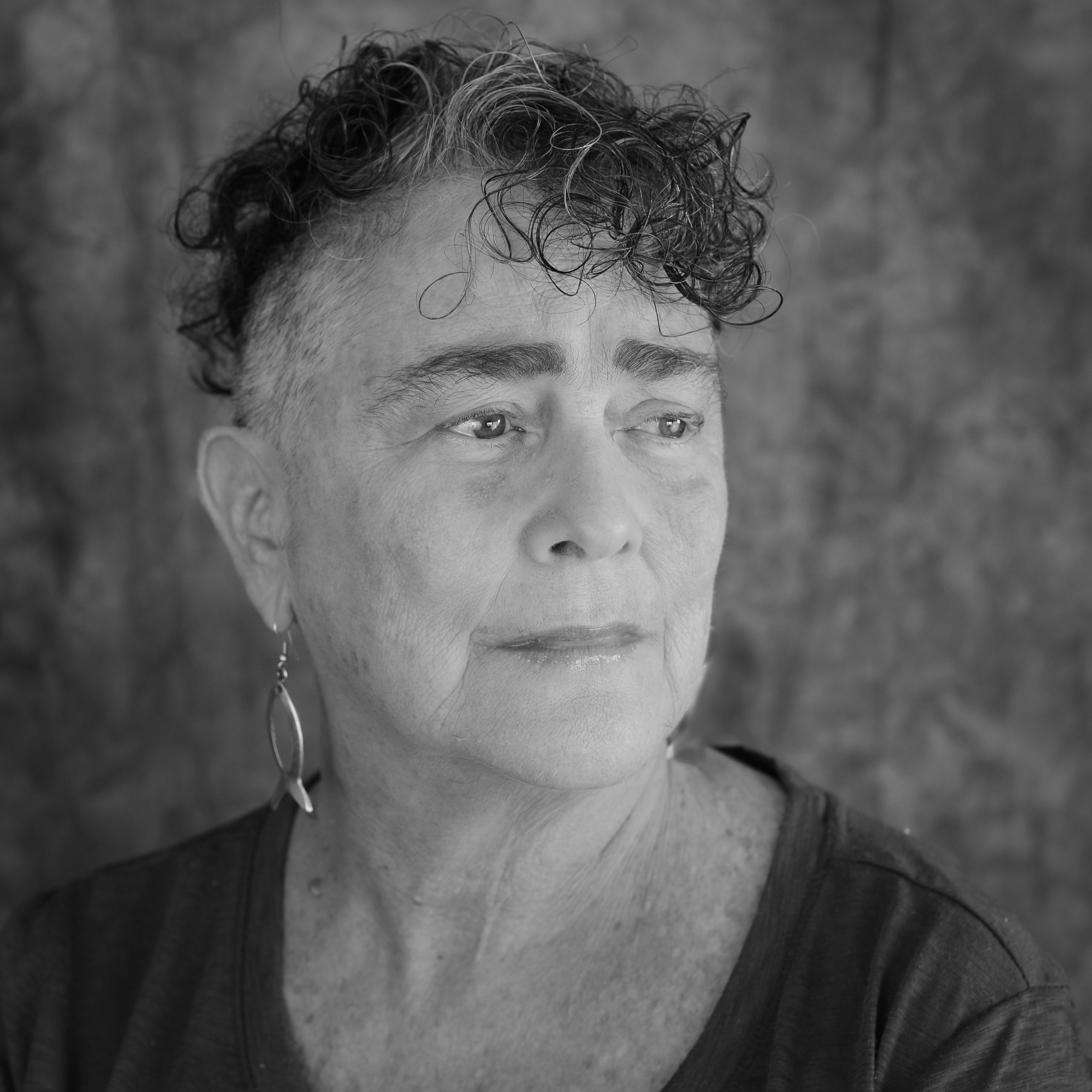The Body as a Witness: A Conversation Between Risa Denenberg & Lynn McGee

Author: Edit Team
October 24, 2019
Poets Risa Denenberg (slight faith, Moon Path Press, 2018) and Lynn McGee (Tracks, Broadstone Books, 2019) talk about the use of experience and imagery in their recent books. Risa Denenberg is co-founder and editor at Headmistress Press, and the author three chapbooks and three full-length collections of poetry. Lynn McGee is the author of two full-length collections of poetry and two award-winning chapbooks.
LYNN: As I read your most recent book of poetry, slight faith, I noticed how many of the images of your poems reside in the body—and that is partly what makes them, for me, so truthful. I’m thinking of these lines from “True Story”:
I was 20 and broke. I went to the free clinic.
Said, ‘please take this damn tooth out of my mouth.’
And he said, ‘first you give me a blow job.’With that mouth. And I did.
Speaking for myself—but knowing it is something other women share—shame lives on, in the body. The visceral beauty of your images—the tooth, the mouth, the breathing—made the experience in the poem unique and yet, they made it one that I could relate to in a more general way. Can you talk about that poem?
 RISA: The odd thing about “True Story” (which I wrote as women I knew were starting to post their “Me Too” stories on social media), is that honestly, I had given it little thought at the time it occurred. I had already had so many transactions with men in which something was exchanged for sex that I accepted it as a price of being a young woman. It was much later that I learned to feel some compassion for myself.
RISA: The odd thing about “True Story” (which I wrote as women I knew were starting to post their “Me Too” stories on social media), is that honestly, I had given it little thought at the time it occurred. I had already had so many transactions with men in which something was exchanged for sex that I accepted it as a price of being a young woman. It was much later that I learned to feel some compassion for myself.
Lynn, I love how the body appears in Tracks: the observation of gender, clothing, adornment, make-up, hair-dos. The way you hone in on those details, the ones that make us individuals, is really quite extraordinary. Lines such as these from “Women’s Long Commute” show your penetrative eye for detail:
She tucks a wisp of hair behind her ear,
scalloped sweater dancing as she strides
to an open seat, ankle boots
all about ‘ankle’ and less about ‘boot’.
A bold decoupage heart on a gold chain
draws the eye toward her clavicles’
soft shadow,
and away from her trachea,
the throat’s chiseled centerpiece.
Can you talk a bit about how you use close observation in your poems? They often stand in for other details such as class and gender, or for emotions such as anger or grief.
LYNN: When I’m commuting, I write down my observations. When I’m bike riding, I stop and dictate them to my phone. Some observations persist in a way that leads to a poem, and some don’t—it can’t be rushed or outlined ahead of time.
For me, noticing such details on the train is a way to preserve humanity in an inhumane environment. It’s so easy to disassociate—which is to me, the ultimate way of giving up. The challenge is to be both watchful, and without agenda.
Risa, the images in your poems are often surprising, which allow me as a reader to enter into their mood. In the poem “Discalced,” the speaker aches: “for the loneliness of our intimacy/ the ruptured husk of us”
and then this happens: “I pull the single/ boot you’ve left behind onto the wrong/ foot, limping room to room.”
That startling image, the speaker’s awkward gait, the wearing of the “wrong boot” and clomping from room to room submerged me into the clumsiness of grief, the time in which we go about our lives dragging the wounded parts along with us.
There is also the sense in many of your poems of climbing out of the dark pit of grief. There are images of a child removed from the speaker’s arms, and betrayals by lovers. How did you manage the meta-cognitive feat of both having the feelings, and writing so effectively about them?
RISA: I have lived alone for a long time now. I am both miles and years away from the pain I have experienced and written about in these poems. I’ve learned that solitude is a leveler, it has allowed me to look at past betrayals and learn to think of them as my story, no longer causing me sharp pain. I could not have written these poems while I was grieving acutely.
Chronic grief becomes melancholy—a state I am comfortable with. It has also given me a large capacity for compassion, which I have needed in order to manage a long career as a nurse. Of course, there are times when I read my own poems and feelings of intense grief reignite. I count that as a blessing, really, I don’t want to be hardened against grieving.
Lynn, I could really ask you the same question about how you handle personal grief. On page 13, when you slide the poem, “Scent” into the first section, after eight poems narrated in a distant voice that witnesses passengers on the subway, I was caught off guard by these lines,
They cut her clothes from her
the scissor’s thick blade nosing
beneath her pants cuff, racing
Up her leg, cold metal leaving its line
across her stomach.
. . . and finding out that this event wasn’t witnessed, that it was the first of many elegiac poems about your sister’s death. In “Elegy for My Sister,” there are hints of who this sister is in your memory, but she remains an elusive character throughout other poems, which are strewn throughout the book. I like the way the book only gradually admits to its grief; this knowledge heightens my appreciation of why you notice things so closely, why the poems are both alert and compassionate, open to the world around you.
The feeling I get from Tracks is of a tragedy that is folded over and over, like origami. I am curious if your process was similar, writing only one sister poem at a time over a long time, or did you work intensely on them over a short period of time, and then place them in the book for your reader to fold together?
LYNN: The sister poems emerged in clusters, every few years after her death in 1999. They began at around the five-year mark, completely gripped me for weeks then suddenly let go. That continued to happen, every few years. In part, the sister poems are triggered by seeing her children grow up and feeling the loss through her eyes. I’ve begun to accept that I will never be finished with this thread in my work, but it will change over time.
RISA: Poems about my best friend’s death from AIDS, are similar to your sister poems in that Jon continues to haunt me, and to live with me. I only have a couple of my “Jon poems” in slight faith, but my first chapbook, What We Owe Each Other, was entirely composed of poems about Jon. The poem, “The Night We Tossed Your Ashes,” shows how deeply I was changed by his death:
because of you
I have ebbed
into a bystander
the rest of my days
without buoyancy or grace
Lynn, I notice that the poems in Tracks are laid down on the page in a way that very much resembles the experience of riding the train. Were you aware of that while you were writing them? In “Jackpot,” for example, we get the sense of the train stopping and starting on its run:
Don’t forget to look up,
As your train whips past crumbling shoulders
Of tenements,
As a man with white curls and paint-spattered shoes
Leans back, closes his eyes.
LYNN: These poems do reflect that physical experience of riding New York City subways. You’re not the first person to have pointed that out to me, and I admit I was the last to know they created that affect. I was literally caught in the stop-and-go rhythm of the train as I wrote this work, and it shows.
RISA: In the same poem, “Jackpot,” the anaphora, repetition of the line “Don’t forget to look up,” adds to the rhythm of the piece. In fact, all of the poems in Tracks bear witness to a poet who pays attention, who doesn’t miss or forget details. How did the experience of paying close attention to your surroundings become so much a part of your practice?
 LYNN: Images are the spine in my poems. They hold them up. Taking notes for Tracks and editing the poems as I commuted back and forth between the Bronx and Tribeca, I tried not to engage in resenting the experience. Instead, I observed it. In the poem you mentioned, I am admonishing the reader to “look up,” and reminding myself to notice and be part of the world, rather than to withdraw from it. I am also advocating for empathy:
LYNN: Images are the spine in my poems. They hold them up. Taking notes for Tracks and editing the poems as I commuted back and forth between the Bronx and Tribeca, I tried not to engage in resenting the experience. Instead, I observed it. In the poem you mentioned, I am admonishing the reader to “look up,” and reminding myself to notice and be part of the world, rather than to withdraw from it. I am also advocating for empathy:
as a woman with a black eye holds her face taut,
moves the red tube tenderly
over her lips.
That could have been you, that staunch face.
That poem ends with running into a fruit vendor as I rushed from the train to the office where I work, and being treated to his vigorous practice of idioms, which felt like a kind of cheering on. Picking up from the stanza above, this is how it ends:
…but instead you inhabit this body
you were born into,
a person who leaves the train and stops at a fruit stand,
asks the vendor for three applesand takes the bag as he sings in new English, every idiom
at his disposal: One in a million! Hit the jackpot!
I’ll see you in heaven!
There it is again, the body, and feeling grounded by observing others.



